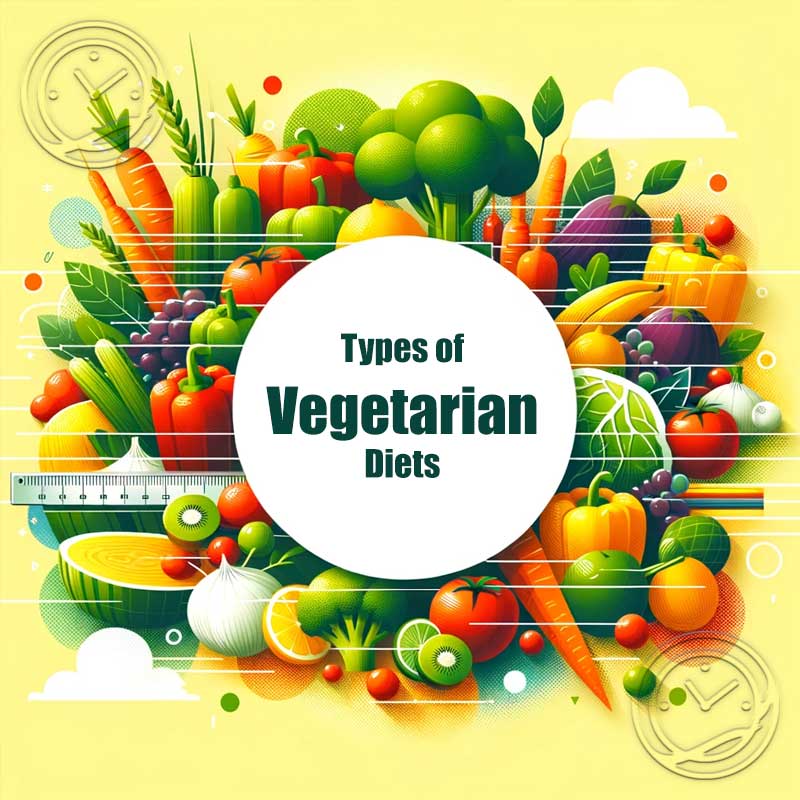Introduction
A vegetarian diet is a diet that excludes meat, poultry, and fish. There are many different types of vegetarian diets, and some people choose to eat dairy products and eggs while others do not. Vegetarian diets can be healthy and nutritious, and they can provide a variety of health benefits.
Some of the benefits of vegetarian diets include:
- Reduced risk of heart disease
- Reduced risk of some types of cancer
- Lower blood pressure
- Improved cholesterol levels
- Increased fiber intake
However, it is important to note that not all vegetarian diets are healthy. Some vegetarian diets are high in processed foods and unhealthy fats, which can lead to weight gain and other health problems. It is important to make sure that you are eating a healthy and balanced vegetarian diet if you want to reap the benefits of this lifestyle.
If you are thinking about adopting a vegetarian diet, it is important to talk to your doctor first. Your doctor can help you make sure that you are getting the nutrients that you need from your diet.
The different types of vegetarian diets
There are many different types of vegetarian diets, each with its own set of beliefs and practices. Some of the most common types of vegetarian diets include:
- Lacto-ovo vegetarians eat dairy products and eggs, but no meat or fish.
- Ovo-vegetarians eat eggs, but no dairy products or meat.
- Vegans do not eat any animal products, including dairy, eggs, meat, or fish.
- Fruitarians eat only fruits, nuts, and seeds.
- Semi-vegetarians eat a vegetarian diet most of the time, but occasionally eat meat or fish.
- Pescatarians eat fish, but no meat or poultry.
- Pollotarians eat chicken, but no meat or fish.
- Flexitarians eat a mostly vegetarian diet, but occasionally eat meat or fish.
- Breatharians believe that they can live off of sunlight and air, and do not eat any food.
- Raw foodists eat only raw or minimally cooked foods.
- Macrobiotic diets are based on the principles of traditional Chinese medicine and emphasize whole grains, vegetables, and beans.
- Mediterranean diets are based on the traditional foods of the Mediterranean region and emphasize fruits, vegetables, whole grains, and olive oil.
- Whole food diets are based on the idea of eating whole, unprocessed foods.
- Plant-based diets are based on the idea of eating a diet that is primarily plant-based.
Each type of vegetarian diet has its own unique set of benefits and drawbacks. It is important to choose a diet that is right for you and that you can stick to long-term.
Are you looking for a healthy and delicious diet that is easy to follow? If so, the Danish diet may…
Benefits
There are many potential benefits of adopting a vegetarian diet, including:
- Reduced risk of heart disease. Vegetarian diets are typically lower in saturated fat and cholesterol than meat-based diets, which can help to reduce the risk of heart disease.
- Lower blood pressure. Vegetarian diets are also associated with lower blood pressure, which can help to reduce the risk of heart disease and stroke.
- Lower risk of type 2 diabetes. Vegetarian diets are linked to a lower risk of type 2 diabetes, which is a chronic disease that affects how the body uses insulin.
- Reduced risk of some types of cancer. Studies have shown that vegetarians may have a lower risk of some types of cancer, including prostate cancer, colon cancer, and breast cancer.
- Improved weight control. Vegetarian diets are often lower in calories and fat than meat-based diets, which can help with weight loss and weight maintenance.
- Increased energy levels. Vegetarian diets are often rich in fruits, vegetables, and whole grains, which are all good sources of energy.
- Better overall health. Vegetarian diets are associated with a number of other health benefits, including improved mood, increased energy levels, and better sleep.
It is important to note that not all vegetarian diets are healthy. Some vegetarian diets, such as those that are high in processed foods and refined carbohydrates, can be just as unhealthy as meat-based diets. However, a well-planned vegetarian diet can be a healthy and nutritious way to eat.
Drawbacks
There are a number of potential drawbacks to vegetarian diets, including:
- The potential for nutritional deficiencies, especially if the diet is not planned carefully.
- The cost of vegetarian foods can be higher than the cost of non-vegetarian foods.
- The social challenges of being a vegetarian, such as finding vegetarian-friendly restaurants and dealing with social pressure to eat meat.
However, it is important to note that these drawbacks are not inherent to vegetarian diets, and can be avoided with careful planning and preparation.
Omega-3 Fatty Acids for Vegetarians
Unlock the secrets to a healthier vegetarian lifestyle with our comprehensive guide to Omega-3 Fatty Acids. Discover the vital role…
How to transition
Transitioning to a vegetarian diet can be a big change, but it’s also a very rewarding one. Here are a few tips to help you make the transition smoothly:
- Do your research. Learn about the different types of vegetarian diets and the nutrients that you need to make sure you’re getting enough of.
- Start slowly. Don’t try to go completely vegetarian overnight. Start by cutting out meat from one or two meals per week and gradually increase the number of vegetarian meals you eat.
- Find vegetarian recipes that you enjoy. There are many delicious vegetarian recipes out there, so you’re sure to find some that you love.
- Talk to your doctor. If you have any medical conditions, talk to your doctor before making any changes to your diet.
- Be patient. It takes time to adjust to a new diet. Don’t get discouraged if you have a few slip-ups along the way. Just keep at it and you’ll eventually reach your goals.
Transitioning to a vegetarian diet can be a great way to improve your health and well-being. By following these tips, you can make the transition smoothly and enjoy all the benefits of a vegetarian lifestyle.
Vegetarian ideas
Here are some simple and delicious vegetarian ideas to get you started:
- Breakfast
- Oatmeal with fruit and nuts
- Yogurt with berries and granola
- Scrambled eggs with vegetables
- Toast with avocado and tomato
- Lunch
- Salad with grilled tofu or tempeh
- Sandwich on whole-wheat bread with hummus, vegetables, and sprouts
- Soup with a whole-wheat roll
- Wrap with falafel or veggie burger
- Dinner
- Vegetarian chili with whole-wheat bread or cornbread
- Pasta with tomato sauce and vegetables
- Tofu scramble with vegetables
- Vegetable stir-fry with brown rice
Coffee Diet Benefits: A Fresh Brew for Weight Loss
Uncover the transformative power of coffee with the enticing realm of the Coffee Diet Benefits. Delve into a world where…
Vegetarian restaurants
There are many vegetarian restaurants available in the United States, Canada, Europe, and other parts of the world. Some of these restaurants are exclusively vegetarian, while others offer a variety of meatless options.
Here are some of the benefits of eating at vegetarian restaurants:
- You can enjoy delicious, healthy meals without having to worry about consuming meat or animal products.
- You can support businesses that are committed to sustainability and animal welfare.
- You can help to reduce the demand for meat and animal products, which can have a positive impact on the environment.
If you are looking for a vegetarian restaurant in your area, there are a few things you can do to find one.
- Ask your friends or family for recommendations.
- Use a search engine to find vegetarian restaurants in your area.
- Check out online directories of vegetarian restaurants.
Once you have found a few vegetarian restaurants in your area, you can visit their websites or call them to learn more about their menus and hours of operation.
Eating at vegetarian restaurants is a great way to enjoy delicious, healthy meals without having to sacrifice your values. By supporting these businesses, you are helping to make the world a more sustainable place.

Vegetarian travel
Vegetarian travel is becoming increasingly popular as more and more people adopt vegetarian diets. There are a number of resources available to help vegetarian travelers find suitable accommodation, restaurants, and activities while on the road.
- The Vegetarian Society’s Travel Guide provides information on vegetarian-friendly accommodation, restaurants, and activities in destinations around the world.
- The Happy Cow website Happy Cow lists vegetarian and vegan restaurants in cities around the world.
- The Vegetarian and Vegan Travellers’ Association VGTA provides a directory of vegetarian-friendly accommodation and restaurants in the UK.
In addition to these resources, there are a number of other ways to find vegetarian-friendly travel options.
- Ask your travel agent or tour operator about vegetarian options.
- Check the websites of hotels and restaurants before you book to make sure they offer vegetarian food.
- Bring your own snacks and meals if you are concerned about finding vegetarian food at your destination.
With a little planning, it is possible to have a great vegetarian travel experience. By following these tips, you can find delicious and satisfying vegetarian food in all corners of the world.
Health
Vegetarian diets are generally associated with good health. Studies have shown that vegetarians tend to have lower rates of heart disease, obesity, and certain types of cancer. However, it is important to note that not all vegetarian diets are created equal. Some vegetarian diets, such as those that are high in processed foods and refined carbohydrates, can be just as unhealthy as meat-based diets.
In order to reap the health benefits of a vegetarian diet, it is important to choose whole, unprocessed foods and to make sure that you are getting adequate amounts of protein, iron, calcium, and vitamin B12.
- Vegetarians tend to have lower rates of heart disease.
- Vegetarians tend to have lower rates of obesity.
- Vegetarians have a lower risk of certain types of cancer, such as colon cancer and prostate cancer.
- Vegetarians tend to have lower blood pressure.
- Vegetarians tend to have lower cholesterol levels.
However, it is important to note that not all vegetarian diets are created equal. Some vegetarian diets, such as those that are high in processed foods and refined carbohydrates, can be just as unhealthy as meat-based diets.
In order to reap the health benefits of a vegetarian diet, it is important to choose whole, unprocessed foods and to make sure that you are getting adequate amounts of protein, iron, calcium, and vitamin B12.
Advocacy
Vegetarian advocacy is the promotion of vegetarianism, which is the practice of abstaining from the consumption of meat, poultry, fish, and other animal products. Vegetarian advocates believe that vegetarianism is a more ethical, environmentally sustainable, and healthy way of living.
There are many different ways to advocate for vegetarianism. Some vegetarians choose to live their lives as examples of the benefits of vegetarianism, while others choose to actively promote vegetarianism through education and activism.
- Living as an example. One of the most effective ways to advocate for vegetarianism is to live your life as an example of the benefits of vegetarianism. This means eating a healthy, plant-based diet, and talking about your reasons for being vegetarian with friends, family, and coworkers.
- Educating others. Another way to advocate for vegetarianism is to educate others about the benefits of a plant-based diet. You can do this by writing articles, giving speeches, or leading workshops. You can also share information about vegetarianism on social media.
- Advocating for change. Vegetarian advocates also work to create change at the policy level. They lobby governments to adopt policies that support vegetarianism, such as meat taxes and subsidies for plant-based agriculture. They also work to change the way that animals are treated in the food industry.
Vegetarian advocacy is an important way to promote a more ethical, sustainable, and healthy world. By living as an example, educating others, and advocating for change, vegetarians can make a real difference.

The future of vegetarian diets
There are a number of factors that suggest that vegetarian diets are likely to become increasingly popular in the future. These include:
- The increasing awareness of the environmental impact of meat production
- The growing body of evidence linking meat consumption to a number of health problems
- The increasing availability of vegetarian options in restaurants and grocery stores
- The growing popularity of vegan and vegetarian celebrities
As a result of these factors, it is likely that the number of vegetarians and vegans will continue to grow in the coming years. This will have a number of positive consequences, including:
- A reduction in the demand for meat, which will lead to less environmental damage
- A decrease in the incidence of diet-related diseases
- A greater variety of vegetarian options available to consumers
- A more compassionate world for animals
The future of vegetarian diets is bright. As more people become aware of the benefits of a plant-based diet, the number of vegetarians and vegans is likely to continue to grow. This will have a positive impact on the environment, human health, and animal welfare.





